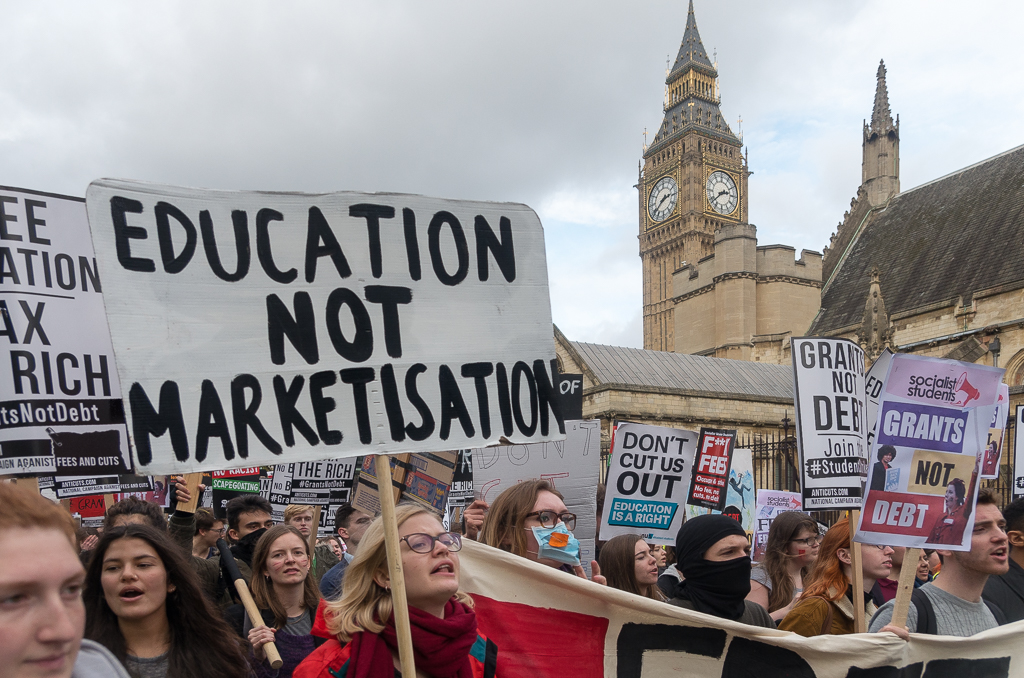3 Threats from the HE White Paper and 1 Way to Block the Government’s Plans
by Anastazja Oppenheim
18 May 2016

This week the government released a higher education (HE) white paper – an 85-page document which lays out proposals for reforming the sector.
Entitled Success as a Knowledge Economy, it is rife with rhetoric of consumer choice, competition and value for money. It paints a radical new vision of education, where markets rule and the idea of the public good has become extinct. Here are three frightening consequences of the HE white paper – and one solution that could save education.
A forced market.
When tuition fees were tripled in 2010, the government intended to create a market where universities would compete on fees as well as quality. Those that could not provide world-class teaching, the logic went, would instead provide less prestigious degrees for a discounted price. The Browne report set out a neoliberal wet dream, where students – ‘customers’ – would choose a degree the way they pick a new laptop or gym membership, considering both the cost and what’s on offer.
However, this hasn’t happened, as virtually all institutions raised their fees to the £9k limit. As well as needing the money to fill in the gap created by the massive cuts to public funding, many were worried about the message lower fees would send. Facing an increasingly competitive and precarious job market, few students would willingly choose a ‘second-tier’ university in order to have £2-3k knocked off their lifetime debt.
Now, the Conservatives are once again attempting to introduce a true market in HE – this time by force. The Teaching Excellence Framework (TEF) intends to score the quality of institutions based on a set of metrics, and universities that achieve good results will be allowed to raise their fees. Within a few years, the goal is to have varied levels of fees in different institutions – sustained not by forces of supply and demand, but by state bureaucracy.
Metrics, metrics, metrics.
The TEF, as its name would imply, is designed to measure ‘teaching excellence’. But what does that mean? How can a panel of bureaucrats put a number on how stimulating, challenging and liberating a course is, and decide on a price tag accordingly? The answer is, it can’t – and the government knows that. Instead, it will largely rely on quantifiable metrics, such as National Student Survey (NSS) results and graduate employment statistics.
Everyone who has recently graduated has probably encountered the NSS. The survey consists of 23 questions (the same for all institutions), where students are made to rate their ‘experience’ on a scale from ‘definitely agree’ to ‘definitely disagree’. The result is a number which can be used to compare universities and form league tables. The survey is aggressively promoted by universities, and pressure is often put on staff to achieve the highest possible result by any means necessary. Most students spend no more than a few minutes completing it. Furthermore, scores are known to be lower in institutions that employ more Black and women academics.
Graduate employment data (as measured by the Destination of Leavers from Higher Education – DLHE – survey conducted six months after graduation) is an equally crude way of measuring so-called ‘teaching excellence’. One must be naïve to believe that your chances of getting a job depend purely on the quality of your education – and not family background and structural privilege.
Yet even in a perfect meritocracy, should teaching really be all about producing the most productive workforce? The government seems to think so – it even plans to invite employers to sit on TEF review panels. We will soon see representatives of big business judging which universities are good, and which should be allowed to fail.
Universities that come and go.
The market drives quality, goes the neoliberal mantra. Therefore, the solution to any problems facing HE must be more competition and less regulation. The white paper opens doors to an influx of ‘alternative’ (read: private, for-profit) providers, which will be able to award degrees from day one, and to become universities without a track record. The risk will be placed on students.
As new providers spring up, established universities are expected to ‘leave the market’ – go bankrupt and close down. Struggling institutions will not receive government support; instead, they will see their funding eroded and will be left to fail, at the expense of students and staff. This will inevitably hurt institutions that don’t generate the highest incomes or the most employable graduates.
Arts and humanities courses are at risk of being squeezed out because they don’t fit the government’s agenda. Universities will be cutting less profitable courses and even entire departments to keep up with the competition. The white paper promises more choice and variety, but it will deliver the opposite – an increasingly homogenised system where education means nothing more than an expensive job training scheme.
Marketisation will also lead to a clamp down on staff. Casualisation will be on the increase, as universities seek to cut costs where possible, and academics will be victimised when they don’t produce desirable scores. The obsession with metrics will see academic freedom eroded.
Students can block this.
In this grim vision, there is a ray of hope.
In April, the National Union of Students voted to support a national boycott or sabotage of the NSS and DHLE. If even a small percentage of students intentionally gave their course all positive, all negative or completely random marks, the results of the survey would become unusable. This would make a lot of the government’s plans impossible to implement. The future of education is now in our hands – when the government talks about student choice, we can choose not to comply.
Photo: RonF/The Weekly Bull/Flickr
–
If you want to support media for a different politics, you can donate or subscribe to Novara Media at support.novaramedia.com.